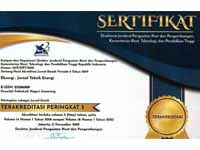Analisis Kinerja Efisiensi Economizer Terhadap Pemakaian Bahan Bakar Boiler Di PLTU Tanjung Jati B Unit 4
DOI:
https://doi.org/10.32497/eksergi.v14i2.1324Keywords:
economizer, bahan bakar, efisiensiAbstract
Economizer adalah alat pemindah panas berbentuk tubular yang digunakan untuk Memanaskan air umpan boiler sebelum masuk kesteam drum. Istilah economizer diambil dari kegunaan alat tersebut, yaitu untuk menghemat (to economize) penggunaan bahan bakar dengan mengambil panas (recovery) gas buang sebelum dibuang keatmosfir. Pada PLTU Tanjung Jati B Unit 4 Jepara menggunakan bahan bakar batubara 100% IMM (Indominco Mandiri) kebutuhan bahan bakar yang dibutuhkan yaitu 26,796 kg/kgbb dengan kandungan excess air sebesar 20,097 % dengan penggunanaan batubara 100% (IMM) yang memiliki komposisi C= 75,69%, H= 5,44%,O= 16,35% dan S=1,01%. Tujuan perhitungan Efisiensi economizer itu sendiri untuk mengetahui berapa persen efisiensi economizer terhadap pemakaian bahan bakar boiler pada PLTU Tanjung Jati B Unit 4 Jepara pada variasi beban 75%, 90% dan 100%. Pada variasi beban 75% di dapatkan ma = 453,41 kg/s serta mg = 1604,035 kg/s sehingga didapatkan efisiensi sebesar 46,12 %, kemudian pada variasi beban 90% didapatkan ma = 551,94kg/s serta mg = 1845,70848 kg/s sehingga didapatkan efisiensi sebesar 35,83 %, pada variasi beban 100% didapatkan ma = 594,63 ð‘˜ð‘”/ð‘ serta mg = 2023,633 kg/s sehingga didapatkan efisiensi sebesar 34,04 %.
Downloads
Published
Issue
Section
License
Authors who publish with this journal agree to the following terms:Authors retain copyright and grant the journal right of first publication with the work simultaneously licensed under a Creative Commons Attribution License that allows others to share the work with an acknowledgement of the work's authorship and initial publication in this journal.
Authors are able to enter into separate, additional contractual arrangements for the non-exclusive distribution of the journal's published version of the work (e.g., post it to an institutional repository or publish it in a book), with an acknowledgement of its initial publication in this journal.
Authors are permitted and encouraged to post their work online (e.g., in institutional repositories or on their website) prior to and during the submission process, as it can lead to productive exchanges, as well as earlier and greater citation of published work (See The Effect of Open Access).






